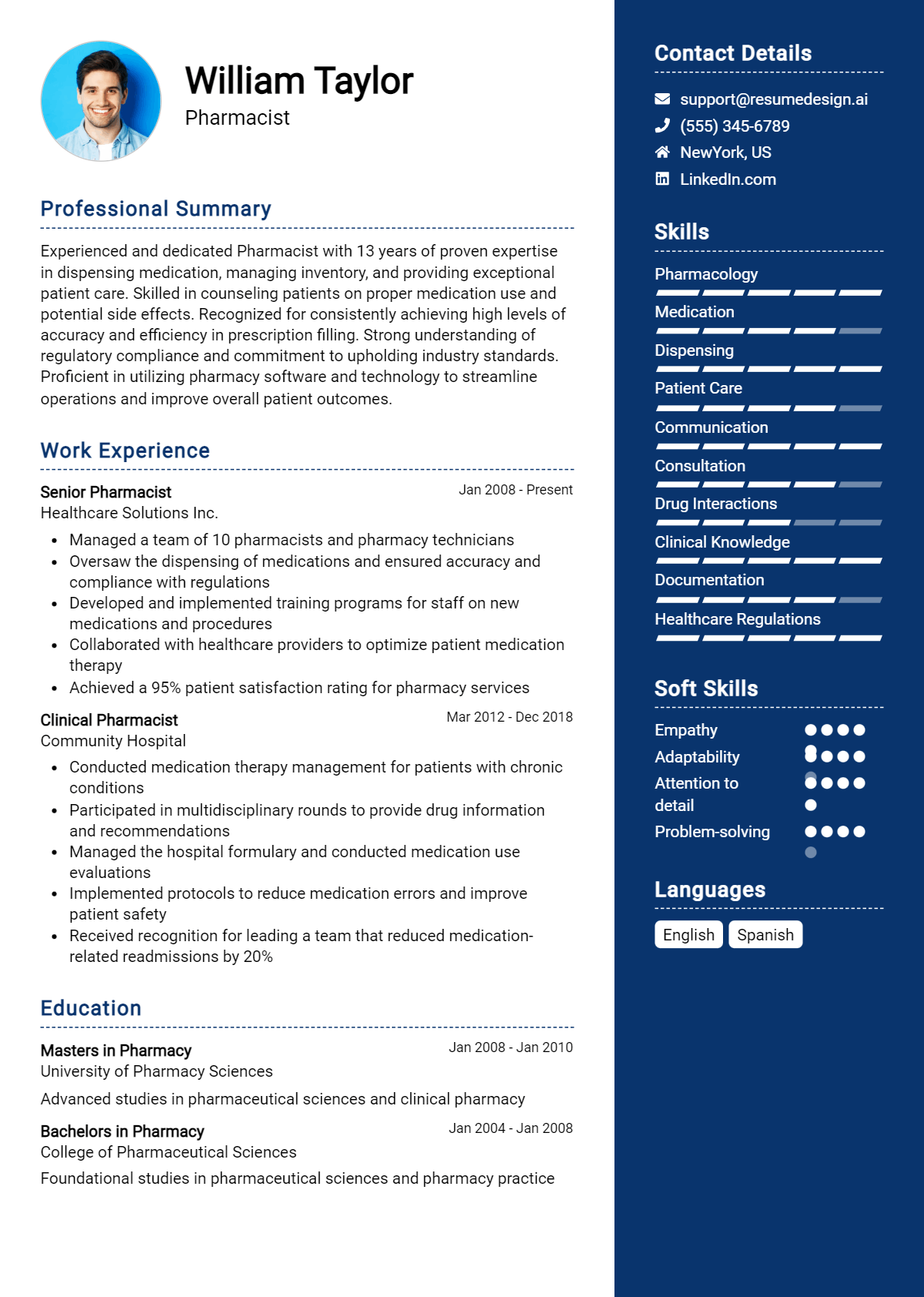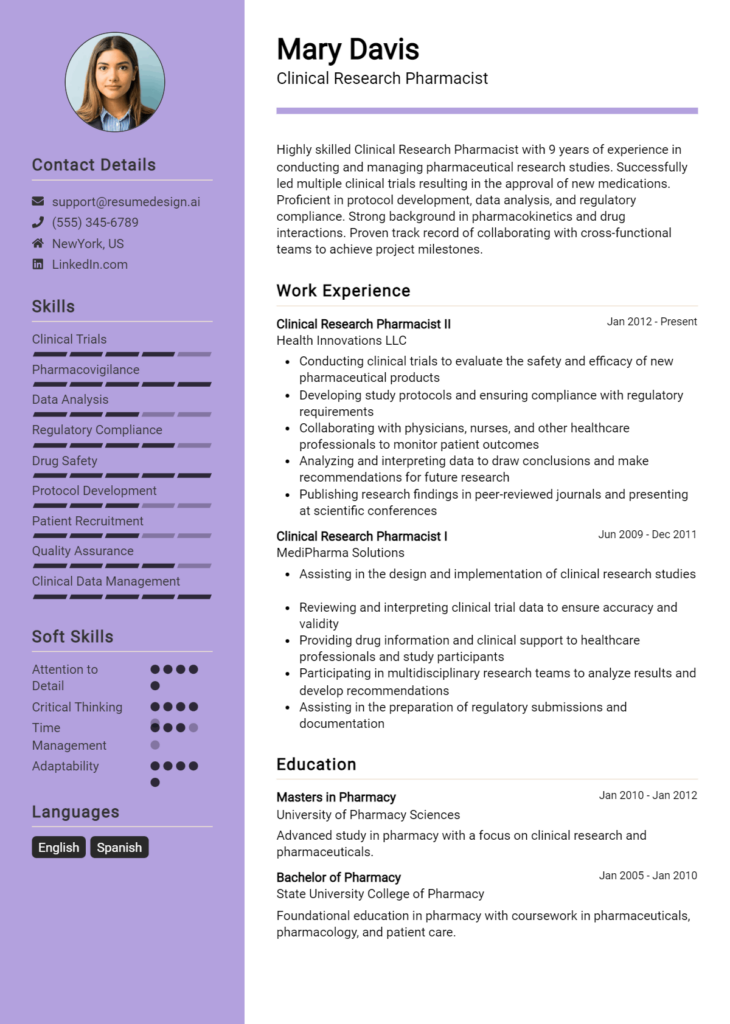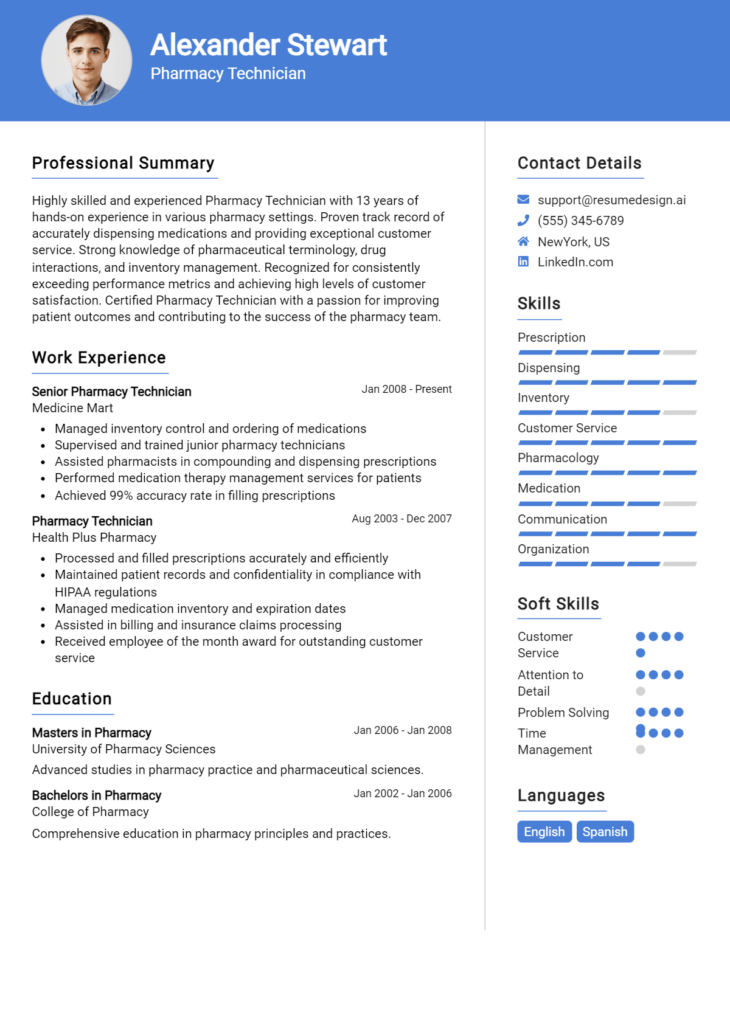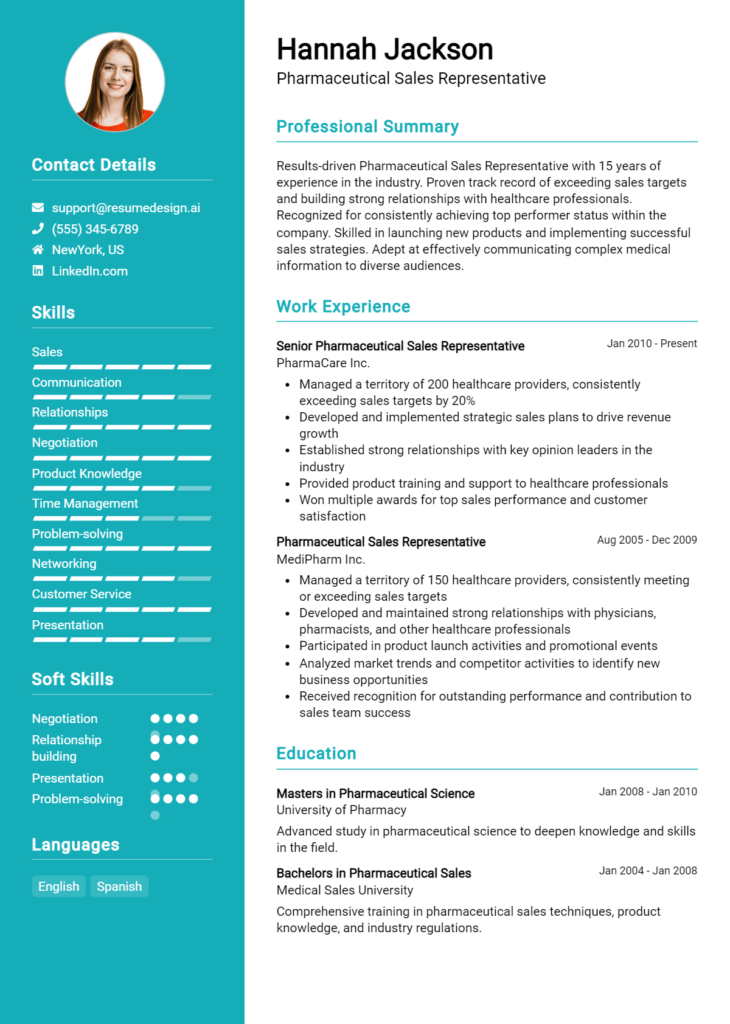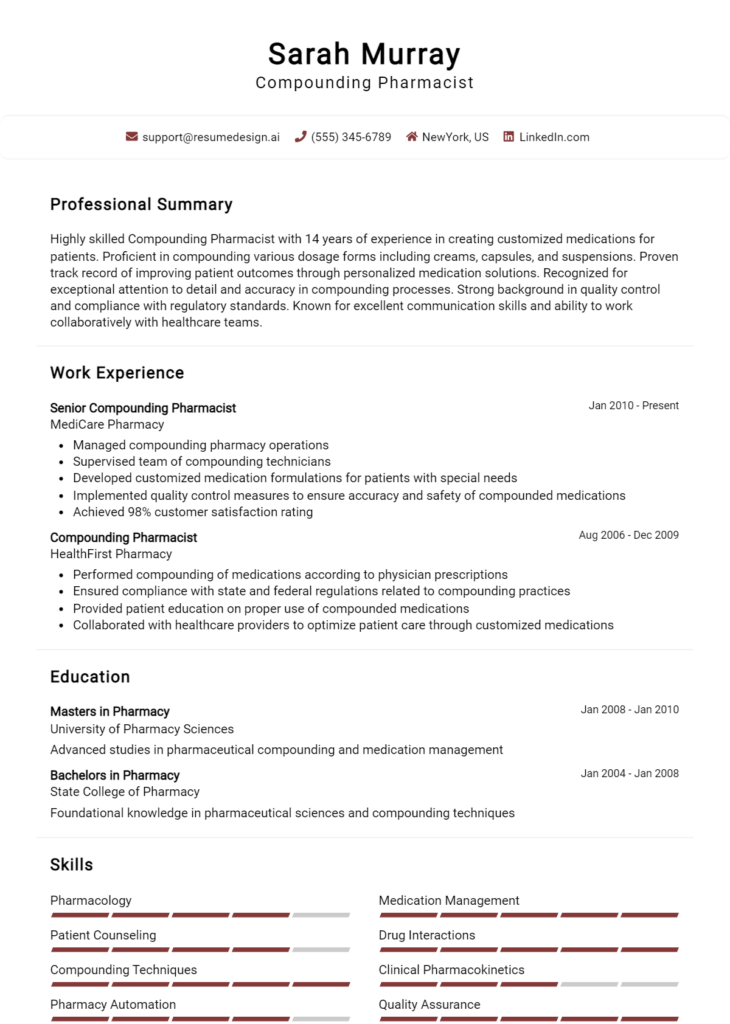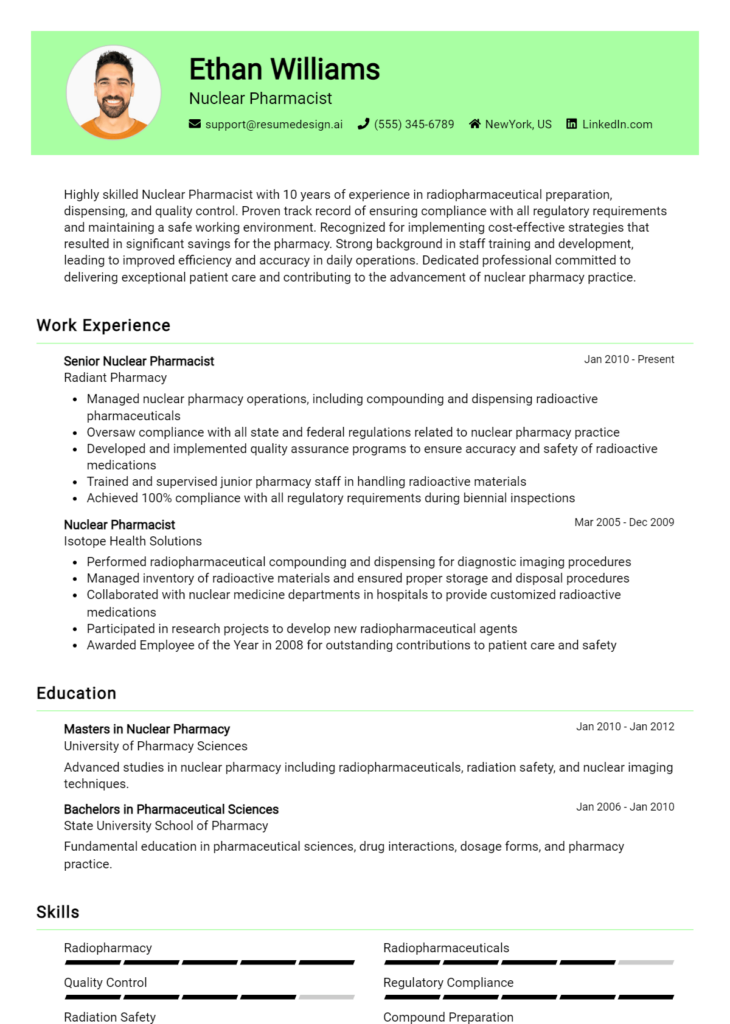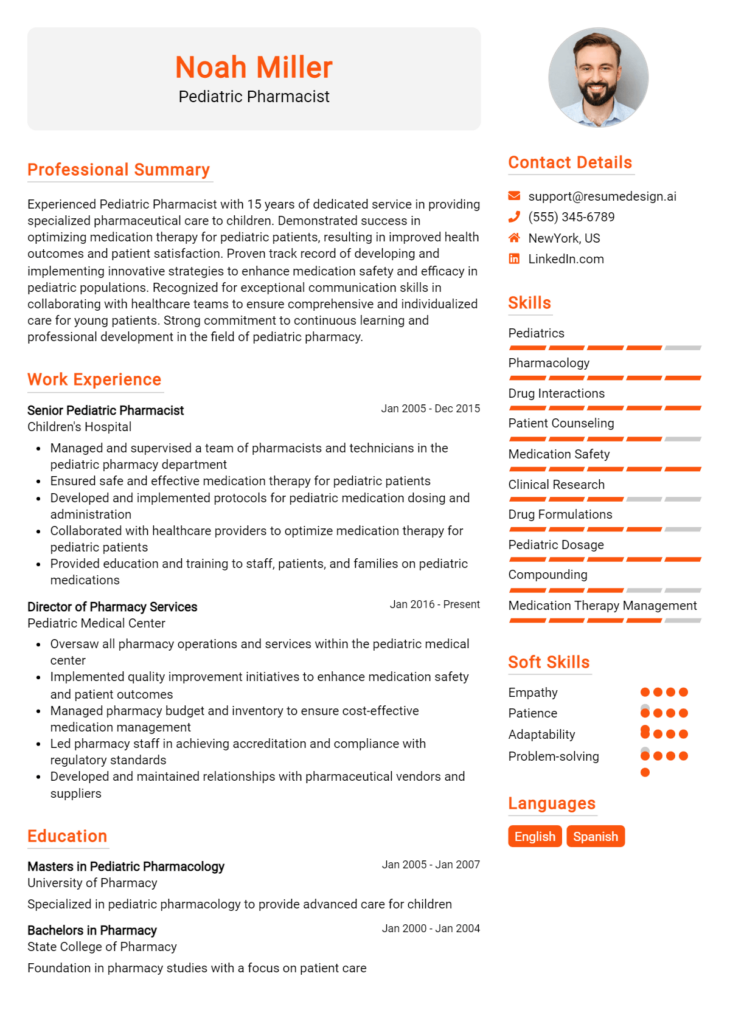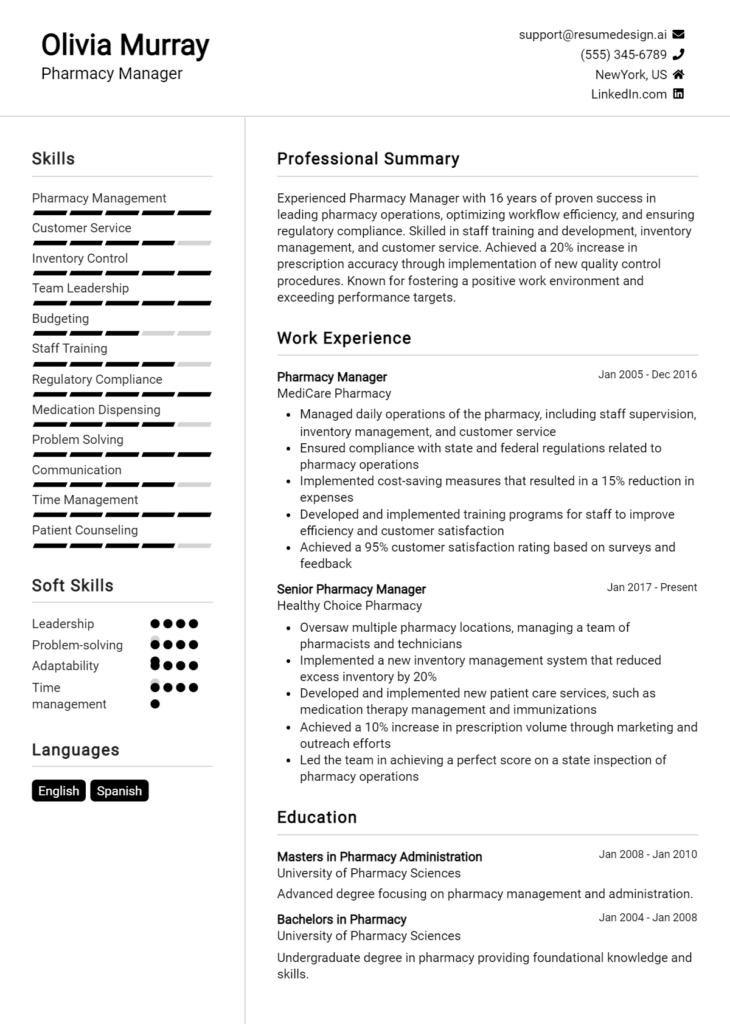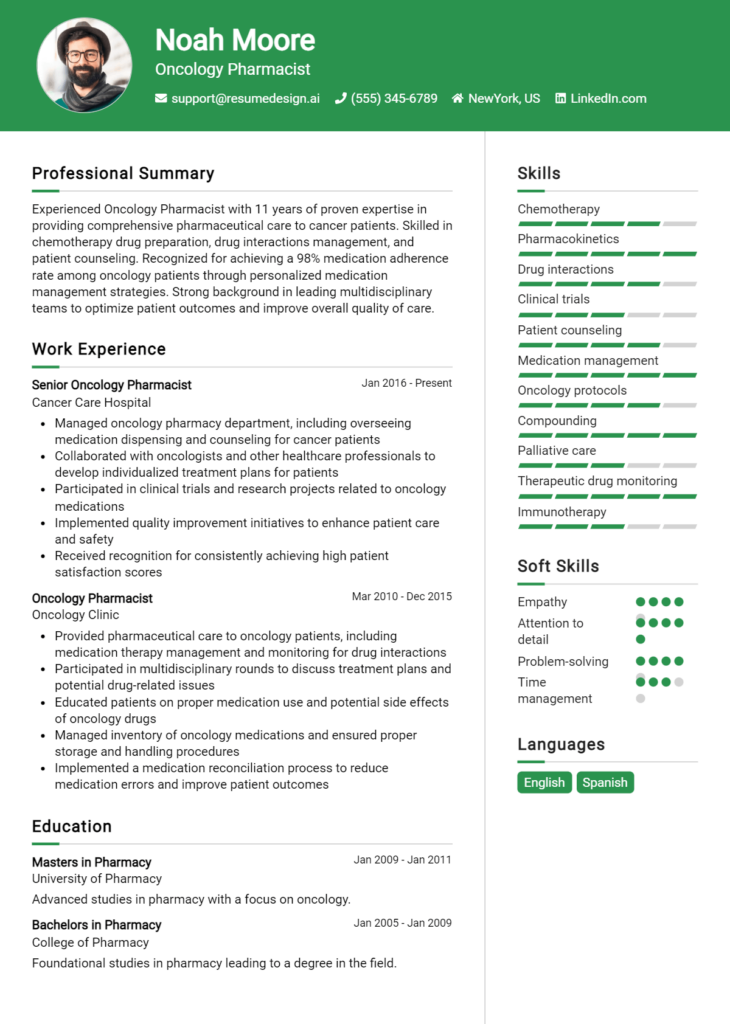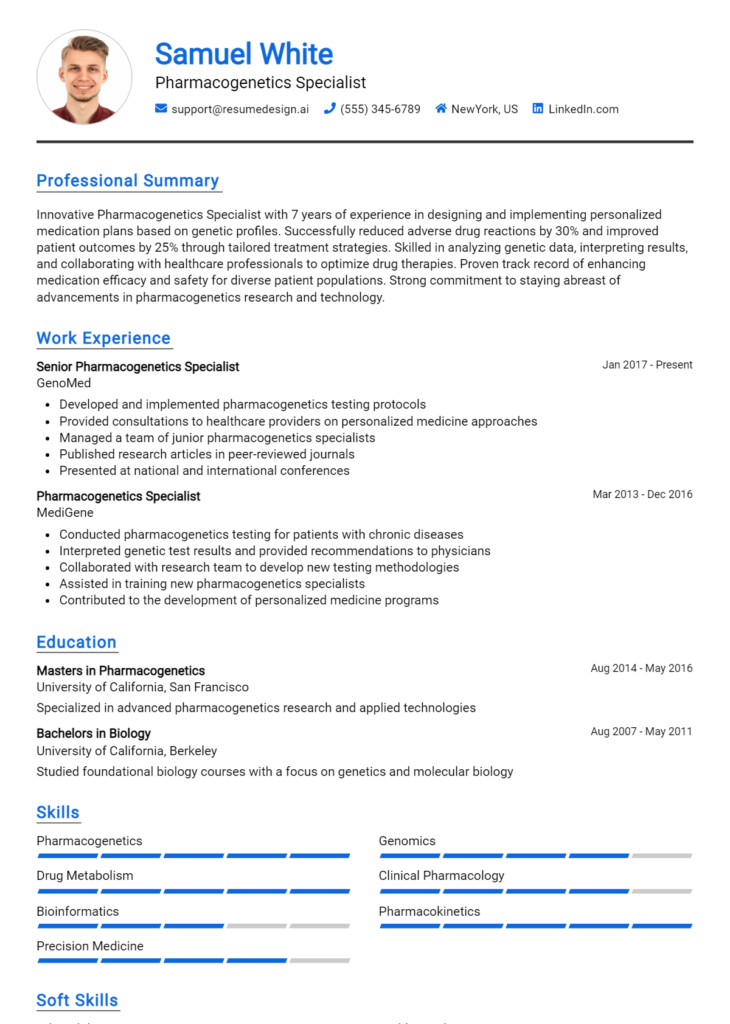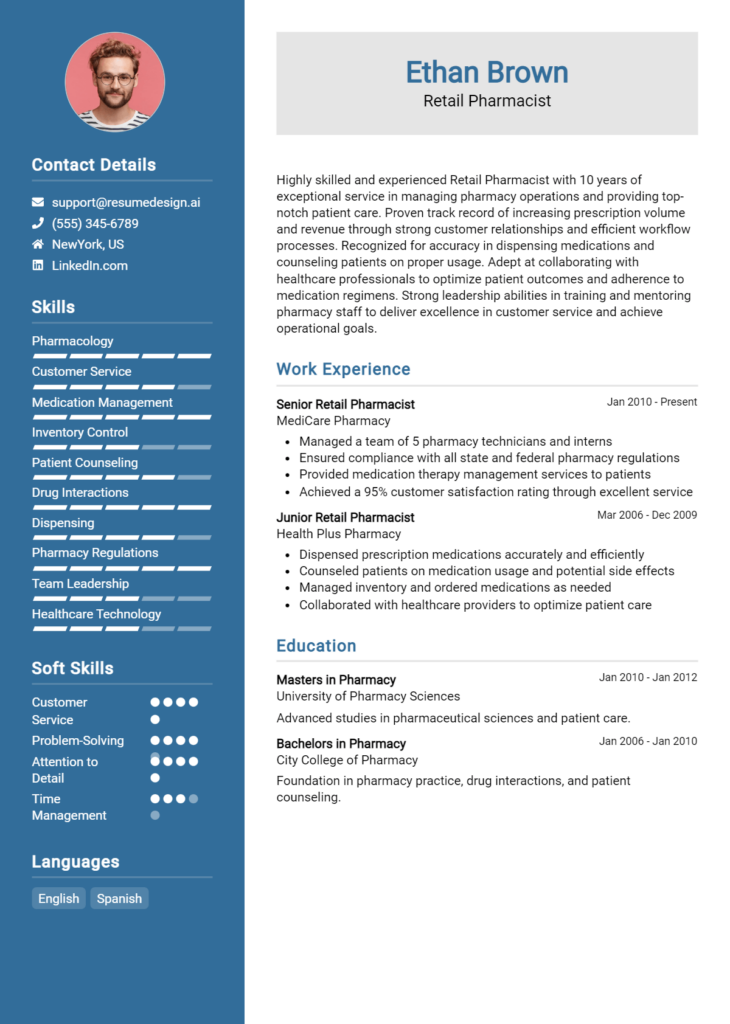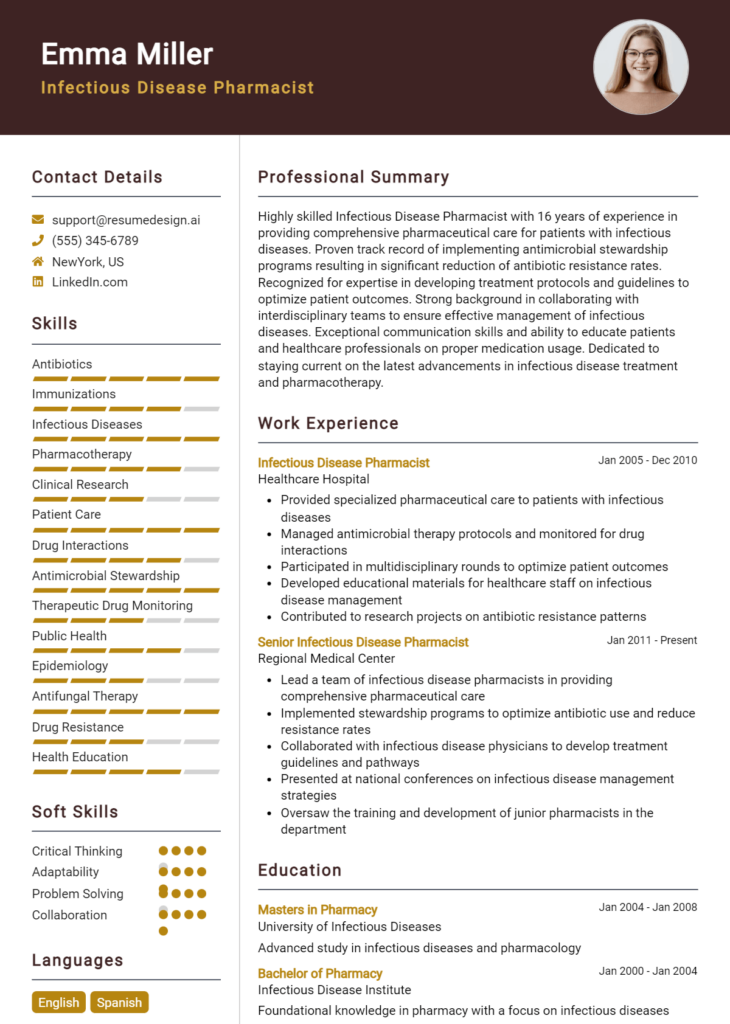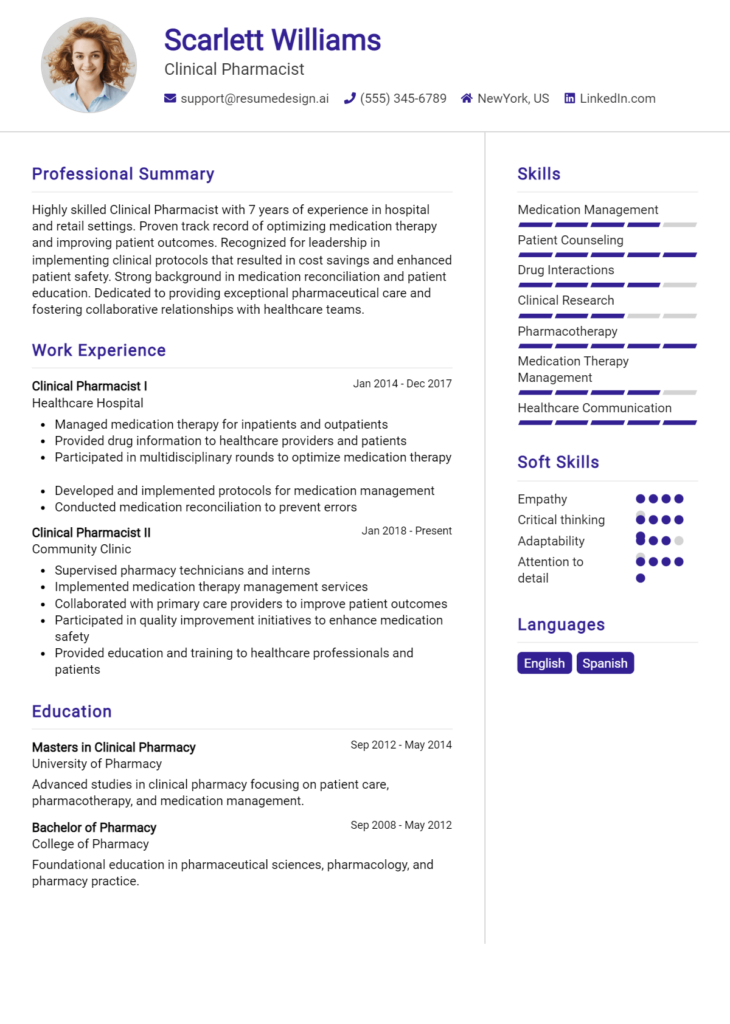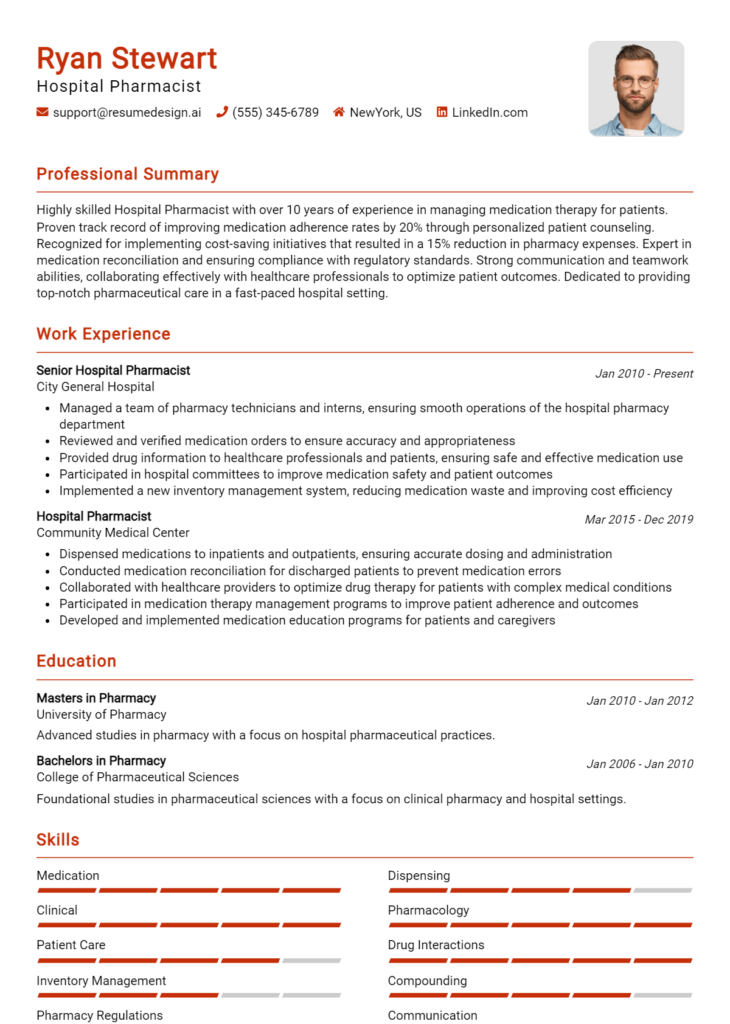Pharmacist Core Responsibilities
Pharmacists play a vital role in healthcare, bridging the gap between patients, healthcare providers, and pharmaceutical companies. Their core responsibilities include dispensing medications, providing patient counseling, and ensuring the safe and effective use of prescriptions. Successful pharmacists possess strong technical knowledge, operational skills, and problem-solving abilities, which are essential in addressing medication-related issues. These skills contribute significantly to the organization's goals, enhancing patient care and safety. A well-structured resume can effectively highlight these qualifications, showcasing a pharmacist's expertise to potential employers.
Common Responsibilities Listed on Pharmacist Resume
- Dispensing prescription medications accurately and efficiently.
- Providing drug information and counseling to patients and healthcare professionals.
- Monitoring patient health and medication therapies for effectiveness and safety.
- Collaborating with physicians and other healthcare providers to optimize medication regimens.
- Conducting medication therapy management and reviewing patient profiles.
- Staying current with pharmaceutical research, trends, and regulations.
- Maintaining accurate records of prescriptions and patient interactions.
- Implementing and ensuring compliance with pharmacy policies and procedures.
- Training and supervising pharmacy staff and interns.
- Managing inventory and ensuring proper storage of medications.
- Participating in health promotion and disease prevention activities.
High-Level Resume Tips for Pharmacist Professionals
In the competitive landscape of the pharmaceutical industry, a well-crafted resume is essential for Pharmacist professionals aiming to make a lasting impression on potential employers. Your resume serves as the first point of contact, showcasing your qualifications, skills, and achievements in a concise manner. It is crucial that your resume not only highlights your technical expertise but also reflects your accomplishments in the field. This guide will provide practical and actionable resume tips tailored specifically for Pharmacist professionals, ensuring you present yourself in the best possible light to prospective employers.
Top Resume Tips for Pharmacist Professionals
- Tailor your resume to the job description by incorporating relevant keywords and phrases that align with the specific role you are applying for.
- Showcase your relevant experience prominently, focusing on roles that demonstrate your skills in medication management, patient counseling, and clinical pharmacy.
- Quantify your achievements where possible, using metrics to illustrate the impact of your work, such as improved patient outcomes or cost savings for the pharmacy.
- Highlight industry-specific skills, such as knowledge of pharmacology, familiarity with drug interactions, and experience with electronic health records (EHR) systems.
- Include certifications and licenses prominently, ensuring that they are easily visible to demonstrate your qualifications to practice as a Pharmacist.
- Utilize a clean and professional format, ensuring your resume is easy to read and visually appealing to capture the attention of hiring managers.
- Incorporate relevant continuing education or training experiences to show your commitment to staying updated in the field.
- Use action verbs to describe your responsibilities and achievements, making your contributions more dynamic and impactful.
- Keep your resume concise, ideally one page, to ensure that hiring managers can quickly grasp your qualifications without sifting through excessive information.
By implementing these tips, you can significantly enhance your resume, making it a powerful tool in your job search. A well-structured and tailored resume will not only increase your chances of catching the attention of hiring managers but also position you as a strong candidate in the Pharmacist field, ultimately leading to more interview opportunities and career advancements.
Why Resume Headlines & Titles are Important for Pharmacist
In the competitive field of pharmacy, a well-crafted resume headline or title plays a crucial role in making a strong first impression. A powerful headline not only captures the attention of hiring managers but also succinctly summarizes a candidate's key qualifications and strengths in a single, impactful phrase. This critical element should be concise, relevant, and directly aligned with the job being applied for, allowing candidates to differentiate themselves from the competition and present their unique value proposition effectively.
Best Practices for Crafting Resume Headlines for Pharmacist
- Keep it concise: Aim for one to two impactful sentences.
- Be specific: Tailor your headline to the job you are applying for.
- Highlight key strengths: Focus on your most relevant skills and experiences.
- Use action words: Start with strong verbs to convey your capabilities.
- Incorporate keywords: Use industry-relevant terms that align with the job description.
- Showcase your uniqueness: Differentiate yourself from other candidates.
- Stay professional: Maintain a formal tone appropriate for the healthcare industry.
- Avoid clichés: Steer clear of overused phrases that add little value.
Example Resume Headlines for Pharmacist
Strong Resume Headlines
Certified Pharmacist with 5+ Years of Experience in Patient-Centered Care
Detail-Oriented Clinical Pharmacist Specializing in Medication Therapy Management
Results-Driven Pharmacist with a Proven Track Record in Inventory Management
Weak Resume Headlines
Pharmacist Looking for a Job
Experienced Individual in Healthcare
The strong headlines are effective because they clearly communicate the candidate's specific qualifications and areas of expertise, making an immediate impact on hiring managers. They utilize relevant keywords and highlight unique strengths that align with the role. On the other hand, the weak headlines fail to impress due to their vagueness and lack of specificity, which does not provide any real insight into the candidate's abilities or fit for the position. This makes it challenging for hiring managers to see the potential value the candidate could bring to their team.
Writing an Exceptional Pharmacist Resume Summary
A well-crafted resume summary is crucial for pharmacists seeking new opportunities, as it serves as the first impression for hiring managers. A strong summary succinctly captures attention by highlighting key skills, relevant experience, and notable accomplishments that align with the job role. It should be concise yet impactful, providing a snapshot of the candidate’s professional identity while being tailored specifically to the job being applied for. This targeted approach can set candidates apart in a competitive job market, making it an essential component of an effective resume.
Best Practices for Writing a Pharmacist Resume Summary
- Quantify Achievements: Use numbers to illustrate your impact, such as the percentage of medication adherence improvements or cost savings achieved.
- Focus on Skills: Highlight key skills relevant to pharmacy practice, such as patient counseling, medication management, and clinical expertise.
- Tailor to the Job Description: Customize your summary to reflect the specific requirements and responsibilities mentioned in the job posting.
- Use Action Verbs: Start sentences with strong action verbs to convey confidence and proactivity.
- Keep it Concise: Aim for 2-4 sentences that deliver maximum information without being overly verbose.
- Showcase Relevant Experience: Include specific areas of pharmacy practice, such as retail, clinical, or compounding, that relate directly to the job.
- Highlight Certifications: Mention any relevant certifications or licenses that enhance your qualifications.
- Convey Professional Passion: Reflect your commitment to patient care and continuous professional development to resonate with employers.
Example Pharmacist Resume Summaries
Strong Resume Summaries
Detail-oriented Pharmacist with over 5 years of experience in clinical settings, successfully improving medication adherence rates by 30% through effective patient counseling and education.
Compassionate and knowledgeable Pharmacist with expertise in oncology, recognized for reducing medication errors by 25% while managing a high-volume pharmacy. Proficient in utilizing electronic health records to enhance patient care.
Results-driven Pharmacist with a proven track record of implementing cost-saving initiatives that reduced pharmacy expenditures by $50,000 annually. Strong background in medication therapy management and patient advocacy.
Weak Resume Summaries
Pharmacist with several years of experience looking for a new opportunity in a pharmacy.
Dedicated pharmacist who is passionate about helping patients and has experience in various pharmacy roles.
The strong resume summaries are considered effective because they provide specific, quantifiable achievements that demonstrate the candidate's impact in their roles. They also include relevant skills and experiences that align closely with the responsibilities of a pharmacist, making them appealing to hiring managers. In contrast, the weak summaries lack detail, specificity, and quantifiable outcomes, which makes them generic and less compelling to potential employers.
Work Experience Section for Pharmacist Resume
The work experience section of a Pharmacist resume is crucial as it serves as a platform to demonstrate a candidate's technical skills and practical knowledge in the field. This section not only highlights the ability to manage teams and collaborate effectively but also showcases the pharmacist's commitment to delivering high-quality products and services. By quantifying achievements and aligning past experiences with industry standards, candidates can effectively communicate their value to potential employers, setting themselves apart in a competitive job market.
Best Practices for Pharmacist Work Experience
- Focus on specific technical skills relevant to pharmacy practice, such as medication management and patient counseling.
- Include quantifiable results, such as the percentage of medication errors reduced or the number of patients successfully counseled.
- Highlight leadership roles, such as managing a pharmacy team or leading a training program.
- Demonstrate collaboration by mentioning partnerships with healthcare professionals and contributions to multidisciplinary teams.
- Use action verbs to convey a sense of initiative and impact, such as "implemented," "developed," and "coordinated."
- Tailor your experiences to align with the job description, emphasizing relevant duties and achievements.
- Include continuing education or certifications that underscore your commitment to professional development.
- Keep descriptions concise while ensuring they provide enough detail to illustrate your contributions and success.
Example Work Experiences for Pharmacist
Strong Experiences
- Implemented a new medication management system that reduced medication errors by 30% over six months, enhancing patient safety and operational efficiency.
- Led a team of 5 pharmacists in a community health initiative that provided free medication counseling, resulting in a 40% increase in patient participation.
- Developed and conducted a training program for pharmacy interns, improving their clinical knowledge and patient interaction skills, as evidenced by a 95% positive feedback rate.
- Collaborated with a multidisciplinary team to redesign the medication reconciliation process, decreasing hospital readmission rates by 15% within a year.
Weak Experiences
- Worked at a pharmacy for several years and helped customers with their prescriptions.
- Assisted in managing the pharmacy and was part of a team.
- Provided medication to patients and ensured they received their prescriptions on time.
- Participated in some training sessions and learned about various medications.
The examples of strong experiences are considered effective because they provide specific, quantifiable outcomes that demonstrate the candidate's impact and leadership within their roles. They highlight not only technical expertise but also the ability to collaborate and improve processes. In contrast, the weak experiences lack detail and measurable achievements, failing to convey the candidate's contributions or the significance of their roles in the pharmacy setting. This underscores the importance of specificity and quantification in showcasing professional accomplishments.
Education and Certifications Section for Pharmacist Resume
The education and certifications section of a Pharmacist resume is crucial as it showcases the candidate's academic achievements, relevant certifications, and commitment to continuous professional development. This section not only reflects the foundational knowledge necessary for effective pharmaceutical practice but also highlights the candidate’s dedication to staying updated with industry advancements. By providing detailed information about relevant coursework, specialized certifications, and ongoing training, candidates can significantly enhance their credibility and demonstrate their alignment with the specific requirements of the job role.
Best Practices for Pharmacist Education and Certifications
- Include only relevant degrees and certifications that relate directly to the pharmacy profession.
- Detail advanced degrees, such as a Doctor of Pharmacy (Pharm.D.), and any specialized training.
- Highlight industry-recognized certifications, such as Board Certification in Pharmacotherapy (BCP) or Certified Diabetes Educator (CDE).
- Provide context for relevant coursework, especially if it pertains to specific areas of pharmacy practice.
- Use clear and concise formatting to make the section easy to scan for hiring managers.
- Update the section regularly to reflect new certifications and educational achievements.
- Include any continuing education credits earned to demonstrate a commitment to lifelong learning.
- Consider adding any leadership or teaching roles in academic settings to showcase expertise and experience.
Example Education and Certifications for Pharmacist
Strong Examples
- Doctor of Pharmacy (Pharm.D.), University of Southern California, 2020
- Board Certified Pharmacotherapy Specialist (BCPS), 2021
- Certified Immunizer, American Pharmacists Association, 2022
- Advanced Pharmacology Coursework, University of California, 2019
Weak Examples
- Bachelor of Arts in Psychology, University of Texas, 2015
- Certification in Basic Life Support (BLS), 2018
- Completed an introductory course in General Chemistry, 2016
- High School Diploma, Anytown High School, 2012
The examples provided highlight the distinction between strong and weak qualifications. Strong examples are directly relevant to the field of pharmacy and reflect advanced education and credentials that are recognized in the industry, enhancing the candidate's marketability. In contrast, weak examples either lack relevance to the pharmacist role or represent outdated qualifications, which do not contribute to the candidate's professional profile in the context of pharmacy practice.
Top Skills & Keywords for Pharmacist Resume
As a pharmacist, having the right skills is essential to excel in the profession and create a compelling resume. Employers seek candidates who not only possess a strong foundation in pharmaceutical knowledge but also demonstrate critical soft skills that enhance patient care and teamwork. A well-crafted resume that highlights both hard and soft skills can significantly improve your chances of landing the desired position. By showcasing your proficiency in technical areas alongside interpersonal abilities, you present a holistic view of your capabilities, making it easier for hiring managers to envision you as a valuable addition to their team.
Top Hard & Soft Skills for Pharmacist
Soft Skills
- Communication Skills
- Empathy and Compassion
- Attention to Detail
- Problem-Solving Abilities
- Teamwork and Collaboration
- Time Management
- Adaptability
- Customer Service Orientation
- Ethical Judgment
- Critical Thinking
Hard Skills
- Knowledge of Pharmacology
- Prescription Management
- Drug Interaction Awareness
- Patient Counseling Techniques
- Pharmaceutical Compounding
- Inventory Management
- Regulatory Compliance
- Clinical Research Skills
- Medication Therapy Management
- Electronic Health Record (EHR) Proficiency
By effectively incorporating these skills into your resume, along with a clear demonstration of your work experience, you can create a powerful application that stands out in the competitive job market.
Stand Out with a Winning Pharmacist Cover Letter
Dear [Hiring Manager's Name],
I am writing to express my interest in the Pharmacist position at [Company/Organization Name] as advertised on [where you found the job listing]. With a Doctor of Pharmacy degree from [Your University] and over [X years] of experience in both retail and clinical pharmacy settings, I am excited about the opportunity to contribute my expertise in medication management and patient care to your esteemed team. My strong communication skills and commitment to patient education align perfectly with your organization's dedication to providing exceptional healthcare services.
Throughout my career, I have successfully managed medication therapy for diverse patient populations, ensuring optimal therapeutic outcomes. At [Previous Employer], I implemented a medication reconciliation process that reduced errors by [X%], demonstrating my ability to enhance patient safety and improve workflow efficiency. My experience collaborating closely with healthcare professionals—including physicians, nurses, and dietitians—has equipped me with the skills necessary to work effectively in a multidisciplinary team. I am particularly drawn to [Company/Organization Name] because of your focus on [specific aspect of the company, such as innovative patient care, community outreach, etc.], and I am eager to contribute to these initiatives.
In addition to my technical expertise, I am passionate about patient education and advocacy. I have conducted numerous workshops aimed at increasing patient awareness about chronic disease management and medication adherence. My ability to explain complex medication regimens in an understandable way has empowered patients to take an active role in their health. I believe that my dedication to fostering strong relationships with patients and my proactive approach to addressing their concerns will make a positive impact on your pharmacy services.
Thank you for considering my application. I am looking forward to the opportunity to discuss how my background, skills, and enthusiasms align with the goals of [Company/Organization Name]. I am eager to bring my passion for pharmacy and patient care to your team and contribute to the outstanding services you provide. Please feel free to contact me at [Your Phone Number] or [Your Email Address] to schedule a conversation.
Sincerely,
[Your Name]
[Your Address]
[City, State, Zip]
[Your LinkedIn Profile or Professional Website]
Common Mistakes to Avoid in a Pharmacist Resume
When crafting a resume for a pharmacist position, it's crucial to present your qualifications and experiences in a clear and compelling manner. However, many candidates make common mistakes that can hinder their chances of landing an interview. By avoiding these pitfalls, you can create a resume that effectively showcases your skills and aligns with the expectations of hiring managers in the pharmacy industry.
Neglecting Keywords: Many resumes fail to include industry-specific keywords, which can be essential for passing through Applicant Tracking Systems (ATS). Use terms found in the job description to enhance visibility.
Too Much Personal Information: Including excessive personal details, such as marital status or a photo, is unnecessary and may lead to biases. Focus on professional qualifications instead.
Lack of Quantifiable Achievements: Simply listing duties without highlighting achievements can make your resume forgettable. Use numbers and specific examples to demonstrate your impact, like increasing pharmacy sales by a certain percentage.
Poor Formatting: A cluttered or overly complex resume layout can distract from your qualifications. Use a clean, professional format with clear headings and bullet points for easy readability.
Generic Objective Statements: Using a one-size-fits-all objective statement fails to grab attention. Tailor this section to reflect your specific goals and how they align with the prospective employer's needs.
Overloading with Jargon: While it's important to showcase your expertise, using excessive technical jargon can alienate non-specialist readers. Strike a balance between professionalism and readability.
Omitting Continuing Education: Pharmacists must stay updated on new medications and regulations. Failing to mention relevant certifications or continuing education can make your resume less competitive.
Ignoring Soft Skills: Pharmacists need strong interpersonal skills alongside technical knowledge. Neglecting to showcase traits like communication, teamwork, and customer service can undermine your application.
Conclusion
As a pharmacist, your role is critical in ensuring the safe and effective use of medications, providing patient care, and promoting health and wellness. Throughout this article, we have highlighted the essential skills and qualifications needed for success in this profession, including a strong foundation in pharmaceutical sciences, excellent communication skills, and a commitment to lifelong learning.
We also discussed the importance of tailoring your resume to showcase your unique experiences, certifications, and achievements that set you apart in the competitive job market. A well-crafted resume can significantly enhance your chances of landing interviews and advancing your career.
Now is the perfect time to review your pharmacist resume and ensure it effectively represents your skills and experiences. Utilize the available tools to help you create a standout application:
- Explore resume templates that fit your style and profession.
- Use the resume builder to create a polished and professional document easily.
- Check out resume examples for inspiration on how to present your qualifications.
- Don’t forget to craft a compelling introduction with the help of cover letter templates tailored for pharmacists.
Take action today and elevate your resume to reflect the expertise and dedication you bring to the pharmacy field!

